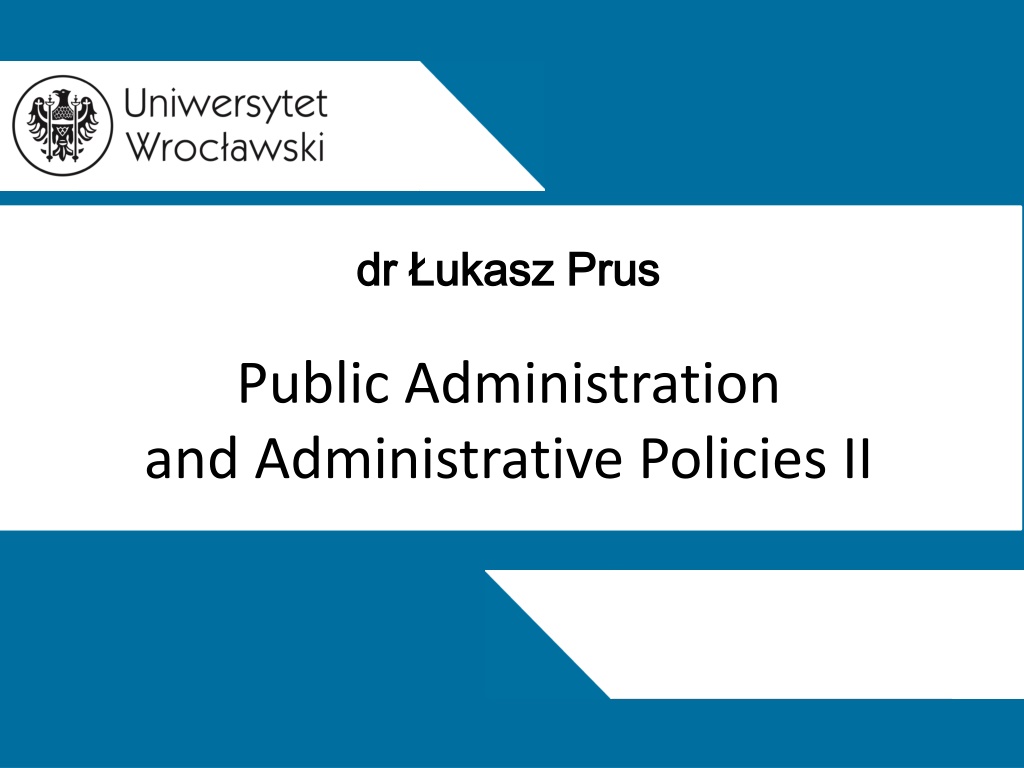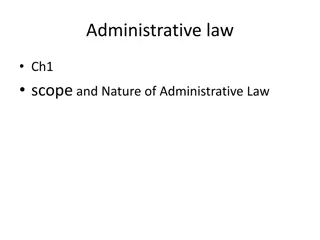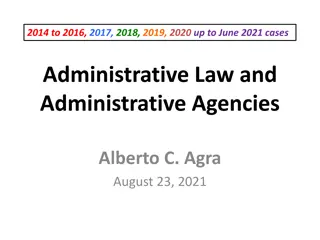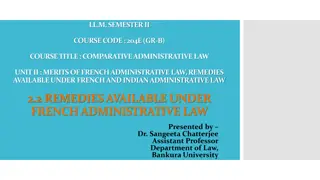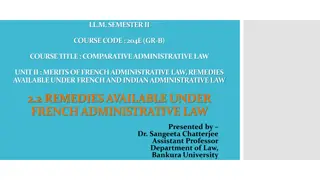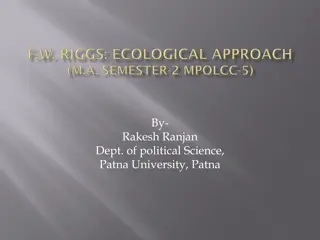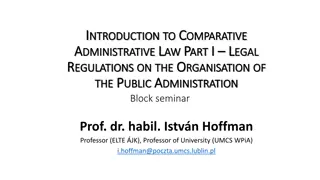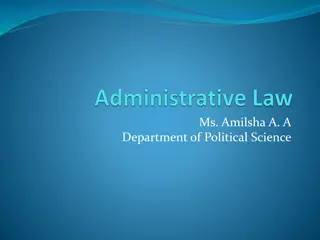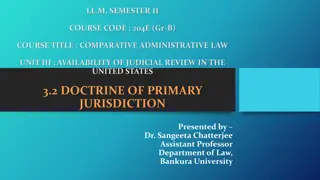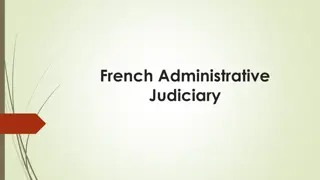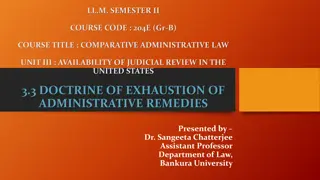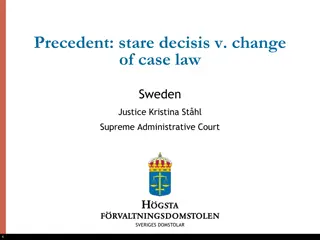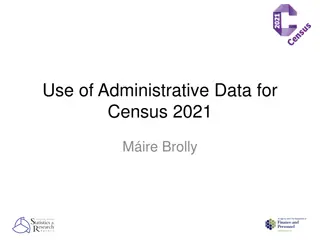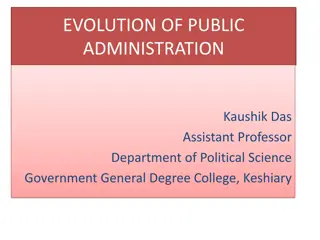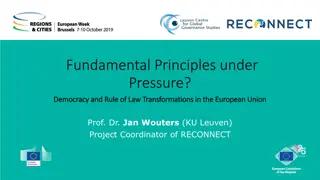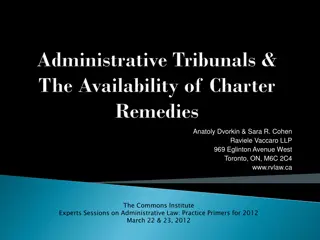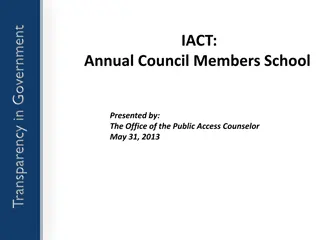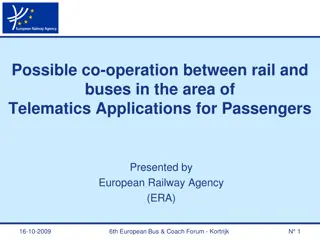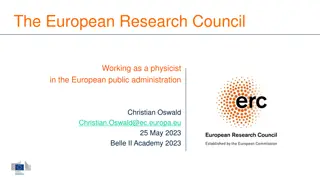Understanding Administrative Law and Public Administration in the European Setting
Explore the interplay between Administrative Law and Public Administration in the context of the European Union. Delve into the principles, case studies, and the importance of organizational settings and procedures in ensuring good governance. Discover how the duties and powers of public administration impact the common good and how maladministration can hinder the public interest.
Uploaded on Sep 14, 2024 | 0 Views
Download Presentation

Please find below an Image/Link to download the presentation.
The content on the website is provided AS IS for your information and personal use only. It may not be sold, licensed, or shared on other websites without obtaining consent from the author. Download presentation by click this link. If you encounter any issues during the download, it is possible that the publisher has removed the file from their server.
E N D
Presentation Transcript
dr ukasz Prus dr ukasz Prus Public Administration and Administrative Policies II
Order of Order of lectures 1. 1. short short introduction introduction 2 2. . case case studies studies - - in cases cases and and the the text text about partly partly written written by Research Research Network on EU Network on EU Administrative and and partly partly written written by me by me Then, Then, you you will will read read the the cases lectures in this this part I part I will will show show you you the the content content of of about principles principles of by a a research research group of public public administration administration in EU group called called ReNEUAL ReNEUAL - - the Administrative Law, Law, in EU the cases in 15 in 15- -20 20 minutes minutes. .
At the end of each case you will find questions. Then you will suggest possible answers Afterwards we will remind the most important assumptions of cases and we will compare your propositions with the decision of the court. In text principles possibly you can find an answer or other suggestions
Administrative Law and Public Administration It is not possible to understand legal enviromental for buissnes without also considering the organizational setting and procedures. Public administration is concerned with the institutional arrangements for the provision of public services and the regulation of governmental activities.
Its focus on the organization, management, and effectiveness of those institutional arrangements. It is also concerned with values such as good government and best practice . Administrative law examines these arrangements in terms of values such as legality, fair procedure, etc
PA and AL are concerned with the duties and powers of the public administration to serve the common good. A public administration which does not function properly is detrimental/negative to the public interest. Such maladministration can be the result of an excess as well as a lack of rules and procedures.
Numerous EU bodies, offices and agencies carry out administrative functions. However the EU does not have a general administrative procedure act governing administrative actions. The EU institutions are governed by fragmented rules and principles established in case-law. There is no established hierarchy of general principles to EU administrative procedural law, not all are equal in content and scope.
The principle of the rule of law, which is part of the Union s values, as recalled in Article 2 TEU applies to administrative actions Article 2 TEU: "The Union is founded on the values of ... the rule of law ... The EU is established, as famously pronounced by the Court in Les Verts case, as a Community based on the rule of law
Although there is a lively academic debate about what that actually means in practice, most people would agree that the rule of law is an umbrella principle with some core content and numerous (sub-)principles, many of which can in themselves be regarded as having a certain independent existence
Moreover the rule of law requires that institutions, bodies, offices and agencies shall act in accordance with the law and apply the rules and procedures laid down in the legislation
One requirement of the rule of law is that actions of public bodies of the EU take place under and within the law. This means that, first, a legal basis is required. Secondly, the institutions and bodies must act within the limits of the powers so conferred on them. A further consequence of the rule of law is the requirement of the correct exercise of discretionary power
CASE STUDY Airport authorities at Vienna airport refused Mr X the right to board a plane WHY? because they found a tennis racquet in his luggage. According to their information, tennis racquets were amongst the items prohibited from being carried on planes.
Mr X, outraged about missing his flight, brought a case before the Austrian administrative court asking for a declaration that it was illegal for the authorities to refuse to allow him to board his plane with a racquet in his luggage
The Austrian court noted that the authorities were acting on the basis of an EU regulation (622/2003) however, that it was impossible for individuals to comply with that regulation, ? since the annex to the regulation listing prohibited items on planes had not been published in the Official Journal of the European Union.
The annex to Regulation 622/2003 adapting the list of articles prohibited on-board an aircraft, was not published in the Official Journal
An act adopted cannot be enforced against natural and legal persons before they have the opportunity to make themselves acquainted with it by its proper publication in the Official Journal.
Until proper publication, tennis racquets and other secretly listed items could be taken on-board. The Vienna authorities refusal to let Mr X board the plane with the racquet was therefore illegal
Legal certainty and the protection of legitimate expectations Legal certainty essentially requires two things: Legal rules be clear and precise, and aim to ensure that situations and legal relationships governed by law remain foreseeable . Individuals must be able to ascertain unequivocally what their rights and obligations are and take steps accordingly
Practically speaking, this has a series of consequences, for example: institutions can not apply rules to individuals which are inconsistent or contradictory; double jeopardy (also known as the principle of ne bis in idem in criminal law and embodied in Article 50 Charter in comparable terms) is prohibited; administrative proceedings must be conducted within a reasonable period of time; retroactive effect of law is, in principle, prohibited.
The right to rely on the principle of the protection of legitimate expectations extends to any person in a situation in which an institution of the Union has caused him to entertain justified expectations .
There are no strict rules as to the form of the representation. It can arise from letters, faxes, emails reports, communications, guidelines administrative practice, codes of conduct or best practice
CASE STUDY Mr Crispoltoni was a tobacco farmer from Lerchi, in the region of Umbria in Italy. He belonged to a producers organization which processed leaf tobacco produced by its members and paid to its farmers an advance for the amount of leaf tobacco delivered by each farmer.
The price was established by the organization on the basis of a EU regulation on minimum pricing for agriculture markets for that year. During the season of 1988 after the farmers had planted the tobacco in April, but before the harvest the maximum quantity of tobacco which profited from the guaranteed minimum price was reduced by the Commission in an implementing regulation.
The orgnization requested its farmers, including Mr Crispoltoni, to repay part of the advance they had received. Mr Crispoltoni turned to the local court against the demand by the organization of farmers. The Court found that the planting of the tobacco plants in April involved the greatest expense to the farmers. Since the Commission regulation was published only after the tobacco farmers had made their decisions on how much to plant that year, the regulation for all practical purposes had retroactive effect .
In this case, the Court held that the legitimate expectations of the operators concerned were not respected, in so far as the measures adopted, although foreseeable, were introduced at a time when they could no longer be taken into account by the farmers since they were not notified in good time of any measures having effects on their investments
Data protection in XXI Under Article 8 Charter, protection of personal information constitutes an individual right against the potential misuse of information both by governments and non-governmental actors. Legal persons are protected with respect to their professional or business secrets
In 1890, in their seminal Harvard Law Review article The Right to Privacy Samuel D. Warren and Louis D. Brandeis lamented that [r]ecent inventions and business methods such as [i]nstantenous photographs and newspaper enterprise have invaded the sacred precincts of private and domestic life . In the same article they referred to the next step which must be taken for the protection of the person.
Nowadays, protecting personal data and privacy of individuals has become increasingly important. The internet has changed/revolutionised our lives by removing technical barriers to exchange of information. Any content including personal data can immediately/instantly be made accessible in digital format world wide.
Google, as a data controller (Internet search engine operator) established in the EU, is obliged to respect EU data protection law (Articles 7 and 8 of the Charter) and therefore has to comply with requests to remove links to certain personal data, under certain circumstances right to be forgotten .
In other words, the CJEU clarified that an Internet search engine operator, such as Google, is responsible for the processing of personal data that it carries out and which appear on web pages published by third parties.
As the data subject may, in the light of fundamental rights under Articles 7 and 8 of the Charter, request that the information in question no longer be made available to the general public by its inclusion in such a list of results, it should be held, that those rights override, as a rule, not only the economic interest of the operator of the search engine but also the interest of the general public in finding that information upon a search relating to the data subject s name.
However, that would not be the case if it appeared, for particular reasons, such as the role played by the data subject in public life, that the interference with his fundamental rights is justified by the interest of the general public in having, on account of inclusion in the list of results, access to the information in question
https://www.google.com/webmasters/tools/legal- removal-request?complaint_type=rtbf&visit_id=0- 636467215753491335-2488345038&hl=en-GB&rd=1
https://www.youtube.com/watch?v=fxrUgTL8THE https://www.youtube.com/watch?v=oxkAyntDjew
